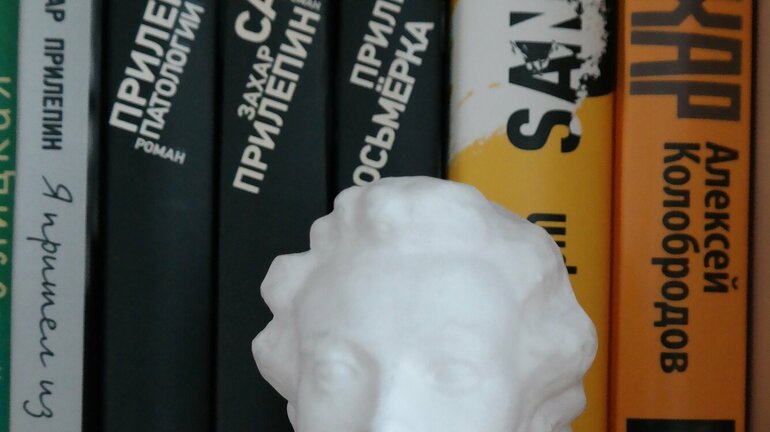It’s Pushkin’s fault

In March 2017, the author Zakhar Prilepin presented his new book The Platoon: Officers and Militiamen of Russian Literature. In this nonfiction text, he introduces eleven biographies of Russian authors from the late eighteenth and early nineteenth centuries, from Derzhavin to Chaadayev to Pushkin, who, as the blurb states, ‘were able to wield not only a quill but also a weapon’. With his book, Prilepin wants to counter the opinion of ‘the usurpers of Russian literature’ that Russian writers were ‘little innocents on thin legs eternally talking about children’s tears’. Rather, they were ready to fight and go to war for their country, at least in Prilepin’s opinion.
He sees himself in this tradition, too: at about the same time as the presentation of the book, a broader audience learned that since autumn 2016 the author had held the position of major in a voluntary battalion in the so-called People’s Republic of Donetsk. Asked what motivated him to join the fighters, ‘I answer seriously: Pushkin’.
One critic suspects that Prilepin’s book will encourage others to follow his example. That times have changed since the nineteenth century and that many of the fighting writers were also opponents of the Russian state is no contradiction for Prilepin. He says that if it had mattered, they would have taken responsibility for their country, which is what counts. In a TASS press conference, Prilepin appeared convinced that today Alexander Pushkin would join his battalion.
The military is a recurring theme in Prilepin’s life: while studying literature, he also completed his training at OMON, the special operations units of the Russian federal police. Between 1996 and 1999, he fought in the Chechen and Dagestan Wars. His first novel, Pathology (2005), deals with this wartime experience. His second novel, Sankya (2006), tells of the fight by a dissident movement against the Russian state. One can easily recognise Eduard Limonov’s National Bolshevik Party as the example for the organisation portrayed in the book. Prilepin was a member of this party, which was never officially registered, until its prohibition in 2007. However, a lot of the party’s extremist-nationalist positions have since become part of Russian mainstream politics. No wonder that Prilepin is enjoying growing popularity in the Russian media.
Prilepin emphasises that he has never made a secret of his efforts ‘for the good of the people of Donbass’. Indeed, the author has supported the pro-Russian separatists there since 2014. He documents his engagement on his blog, for example the distribution of food and medication. Moreover, he worked as a war reporter in the region. He also records his military engagement through photos and videos that he posts regularly on his blog. A reportage in the Russian daily Komsomolskaya Pravda about Prilepin’s engagement at the front and the media coverage around the publication of The Platoon presented all this to a wider audience.
Traditionally, there has been a multilayered relationship between literature and power in Russia. On the one hand, there is the power of literature – the impact that is attributed to literature in Russia. Writers have acted as critics and admonishers time and time again. Texts have encouraged social debates and accompanied political changes. On the other hand, there is a tradition of literature in Russia which supports state power. Alongside panegyric, which praises the first among rulers, be he tsar, general secretary, or president, there is also literature that supports the political line of the ruling power. Rulers rewarded writers for their loyalty to the state with financial support, privileges like access to dachas or special restaurants, and high print runs.
This well-developed state system of literary support collapsed with the Soviet Union. Today, it’s above all the market which decides on an author’s success. That doesn’t mean that literature and power are no longer linked. Prilepin uses his popularity as a writer to spread his political positions. As these in many respects match the contemporary interests of the Russian political elites, this creates more media attention – which also means higher sales figures for his books: a win-win situation for both the author and the rulers.
However, Prilepin’s explanations haven’t gone unchallenged. In an interview with the Russian daily Kommersant, Vladimir Sorokin, one of the internationally best-known authors of Russian contemporary fiction, pointed out that ‘many Russian writers of the nineteenth century didn’t volunteer for the war’. This argument would invalidate Prilepin’s ‘primitive little idea’. Sorokin devoted no more than three phrases to this subject before continuing to talk about the contemporary novel. (What Sorokin thinks about Prilepin can be discovered in Sorokin’s latest novel, Manaraga (2017), which includes a scene parodying Prilepin.) Only a few hours later, Prilepin published a reply in which he contradicted Sorokin. ‘Peace,’ he writes, is ‘no gift’; ‘peace’ means ‘work and service’. He himself is for peace; he doesn’t know what others are for. ‘And it doesn’t matter to me.’
What Prilepin’s engagement for peace looks like can be seen in a recently posted video. In the video, the author, dressed in uniform, holds a piece of paper with a peace sign towards the camera, recites a few phrases (‘All writers of the world have always stood up for peace. . . . I also stand up for peace.’), then asks the cameraman if everything has been recorded. When he confirms, Prilepin scrunches up the paper and gives an order, after which two men in uniform open fire in the background. Of course, this is no accidental take, but a careful enactment with a clear message: whoever wants peace must fight for it.
Nina Frieß is Research Associate at ZOiS. With a collegue she has recently written a joint article about Prilepin for the online platform dekoder.